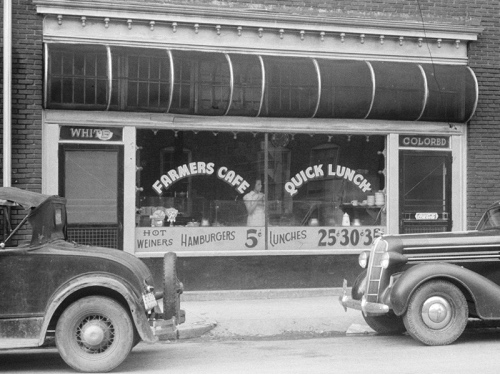
US columnist RICHARD MOUW, in an article first published by Religion News Service, reflects on how the issue of racial justice needs both law – and love…
A pastor from a small Midwestern US town once asked me for advice.
“I serve a congregation in an all-white town. The nearest city is an hour’s drive away,” he said. “How do I get my people to actually feel for people of other races?”
Before I tell you what I answered him, let me share an experience that got me thinking seriously about racial justice when I was in my late teens.

Separate customer doors for “White,” left, and “Colored” at a cafe during tobacco auction season in Durham, North Carolina, in November, 1939. PICTURE Marion Post Wolcott/Library of Congress via Creative Commons.
“Songs and sermons are not enough unless they are intentionally grounded in what we have come to label ‘spiritual formation’. Despite a half-century of legislative advances we still see the horrible themes of racial superiority at work in our culture.”
I accompanied my father to a church denominational gathering in Pennsylvania, where delegates were debating whether to adopt a motion condemning racial discrimination. Several of the speeches warned against the church’s getting into matters of legislation. We need “love and not laws,” was one theme. Another was: “Only changed hearts will change society.”
Toward the end of the debate, an African-American delegate rose to speak. He told how he and his wife had just driven across the country from California to attend the meeting. At one point, he said, they traveled a whole day without finding a restaurant that would serve them food. One waitress had simply ignored their request to be seated, even though there were many empty tables. His comment was memorable: “It would be wonderful if that waitress loved us. But right then we were not asking for love – we wanted cheeseburgers!”
Hearing that speech motivated me to get more active in working for “systemic” change. And progress was certainly made over the next decades on legislative reform. Nowadays the waitress at that restaurant would be required by law to seat that couple and serve them their cheeseburgers.
There is no guarantee, though, that a present-day waitress at that same restaurant would greet a similar African-American couple with a more loving heart. Nor do the chances of her being more loving necessarily increase if she happens to be a member of a local church.
She could well have been taught the Sunday school song that Jesus loves all the children of the world, “red and yellow, black and white, they are precious in his sight”. And surely she will have heard sermons about the good Samaritan and the obligation to “love your neighbor as yourself”.
But songs and sermons are not enough unless they are intentionally grounded in what we have come to label “spiritual formation.” Despite a half-century of legislative advances we still see the horrible themes of racial superiority at work in our culture.
Ultimately, doctrines of racial superiority have to be destroyed in the deep places of our souls. Religious leaders need to give sustained attention these days to the deep places in the human soul where those doctrines seem to take root so easily.
The late Ronald Thiemann of Harvard Divinity School urged in his writings that local congregations should function as “‘schools of public virtue,’ communities that seek to form the kind of character necessary for public life”.
“How we, in our local places of worship, engage in that ‘schooling’ is of vital importance right now, where we see the real possibilities that what we have gained in implementing legal change can easily be ignored, or even reversed. Love without laws is not enough, but for the benefits of our laws to be sustained, loving hearts are a necessity.”
How we, in our local places of worship, engage in that “schooling” is of vital importance right now, where we see the real possibilities that what we have gained in implementing legal change can easily be ignored, or even reversed. Love without laws is not enough, but for the benefits of our laws to be sustained, loving hearts are a necessity.
When the Midwestern pastor asked me for advice, I observed that the technology for addressing his concern was easily accessible. He could have young members from his church go to the big city and record five-minute video conversations on their smart phones with members of an inner-city congregation, asking what concerns in their daily lives the folks back home could pray about on Sundays. Then they could play the videos at their church services. And, equally important, they could record similar segments by their fellow church members for the folks in the city.
One impact that the personal story told by the black delegate to the church convention had on my teenage self was empathy. I began to care about whether folks like that couple got served in restaurants. It made perfect sense to me that I would soon be hearing reports about public efforts to integrate lunch counters in the South – access to cheeseburgers was important to the beginnings of the civil rights movement. Spiritual formation for caring about justice requires stories that create empathy. It requires seeing the faces of our fellow citizens and hearing their voices.
Making five-minute smartphone recordings is not a very radical plan. But it is a step toward putting faces on very real human concerns. To be sure: only a small step. But even a change of a few “hearts” here and there can take us in new directions as a nation. “Changed hearts” alone are not sufficient for a just society. But justice cannot be sustained for very long without them.





